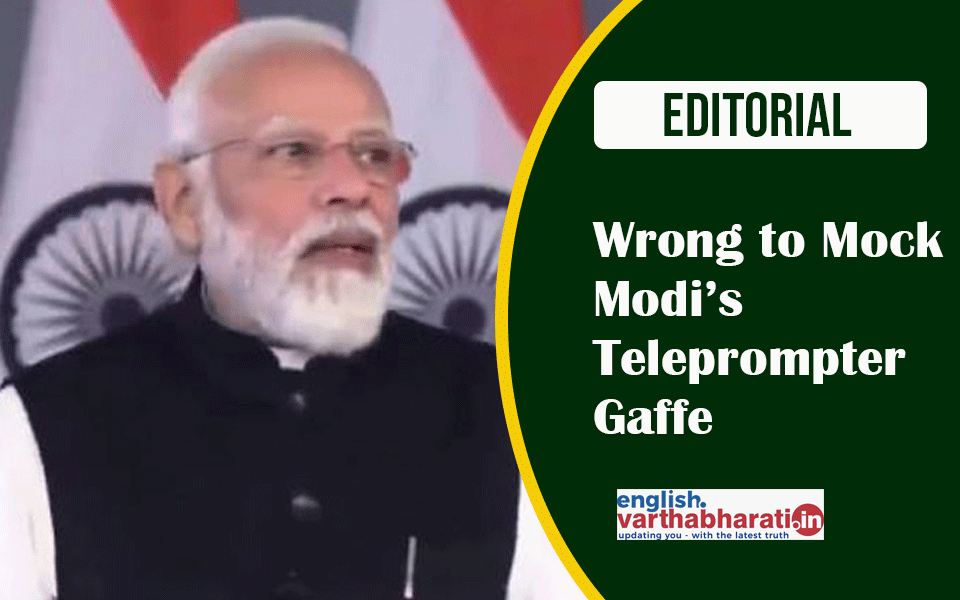Prime Minister Narendra Modi’s teleprompter gaffe at the World Economic Forum where Modi seemingly struggled to deliver his speech after the teleprompter stopped working is being trolled on social media. These trolls contend that the Prime Minister cannot make a speech without looking at the teleprompter, which according to them is a weakness, and are using this incident to attack Modi. When the repeated blunders that Modi has made so far are before us, how right is it to project the teleprompter gaffe as a major problem and thereby the country’s failure? Adopting the Sangh Parivar’s strategy of repeating a lie till it becomes the truth would be akin to looking away from the real issues. Public discourse should be about presenting the real issues that the country is facing, not mocking at the Prime Minister’s colour, language, or his eloquence or lack of it.
First, the veracity of the fact that Modi stopped his speech midway due to the glitch in the teleprompter needs to be examined. Initially, when the Prime Minister was struggling for words people, assumed that the teleprompter stopped working and several websites were quick to share the videos. But the reality was something different. Modi had apparently stopped speaking not because of the teleprompter but because the event organizers had asked him to stop as the audience was unable to hear him that caused him to stutter a bit. But the initial misconception spread like wildfire in social media. True, if an incident like this had occurred when Dr Manmohan Singh was the Prime Minister, Sangh Parivar’s karyakarthas and trolls would have celebrated it. Even if we were to assume that Modi stammered due to the teleprompter’s malfunctioning, then the criticism should be directed against the quality of the teleprompter and the irresponsibility of the organizers, not against the Prime Minister.
Moreover, the question is whether it is absolutely necessary that a Prime Minister must be eloquent. These days, it appears that the more eloquent a leader is, the more dangerous it is to the country. Prime Minister Modi is an example. Good speakers mesmerize people through their words. The country has rarely found good, eloquent speakers who are also seasoned politicians. Of these, Jawaharlal Nehru stands out. With his words and programmes, Nehru contributed immensely not only to the country but also to the Third World. At the same time, although Manmohan Singh was not a great orator, the entire world respected his words as he is one of the tallest economists in the world. Prime Minister Modi has so far entertained people through his speeches but Modi’s bhakths are coming to know where the country has reached today. That Modi cannot deliver a speech without a teleprompter is not the issue at all. What needs to be discussed is whether, regardless of the presence of the teleprompter, his speeches have a vision. In the entire teleprompter fiasco, the lies that Modi delivered at the World Economic Forum about the state of the country were not discussed at all.
More than the appropriateness of a Prime Minister using a teleprompter, the compulsory use of a teleprompter by someone occupying a top position such as the Prime Minister’s office must be emphasised. Speaking from such a responsible position, it is important to ensure that words are used carefully as otherwise, words that are misunderstood or misconstrued could lead to dangerous situations. It is therefore important that the Prime Minister is well aware of what he is talking about, and he uses the help of different media to read his speeches. This is a good time to note that Modi’s blind followers are responsible for pushing him to this situation. They projected Modi’s speeches as the greatest gifts for the country instead of focusing on his administration. The behaviour of his followers is also responsible for the discussions around the teleprompter. It is high time Modi bhakths who are always focusing on the ‘positive energies’ in his speeches realize that the Prime Minister’s job is not only to deliver speeches but also to take the country on the path of development and start critiquing Modi’s administration.
Let the Truth be known. If you read VB and like VB, please be a VB Supporter and Help us deliver the Truth to one and all.
Kalaburagi: Four men have been arrested in Kalaburagi on charge of hacking a man with lethal weapons and pelting stones at him under the limits of Station Bazaar Police Station recently.
According to police sources, Anand Jalak Shinde (34), Ashitosh Jalak Shinde (30), Imran Mehboob Sheikh (28) and Sohaib Anwar Qureshi have been arrested. The men are accused of the brutal murder of Syed Mehboob, a resident of Station Bazaar Upper Line Hamalawadi in the city.
An FIR was filed by the Station Bazaar Police Station based on a complaint given by Syed Ismail, father of the deceased Syed Mehboob.
Following quick probe, the police team successfully arrested the suspects within 24 hours. The arrested men were produced in court and have been sent to judicial custody.
The City Police Commissionerate has appreciated in an official release the police team’s quick solving of the murder case and arrest of the four men accused of murdering Syed Mehboob.





